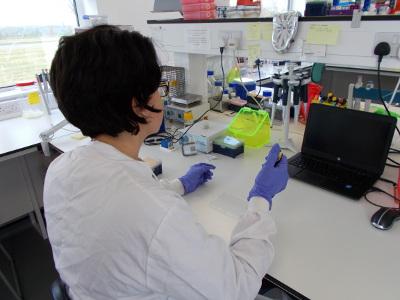OU academic joins Mologic team to develop rapid diagnostic test for COVID-19

An OU academic is working with a team to develop a rapid diagnostic test for COVID-19.
Results within 10 minutes
Dr Judith Taylor, a Lecturer in the OU’s Graduate School, has been seconded to Mologic Ltd, a leading developer of lateral flow and rapid diagnostic technologies, to work on the quick delivery of tests for COVID-19, which will determine whether people have, or have already had, the virus.
Ultimately, the device will allow users to test for exposure to the virus at home, in the community, or in the clinic, providing a result within 10 minutes.
Global team
Mologic was awarded a grant of around £1M by UK government to develop this diagnostic test, as part of the UK government’s £46 million international COVID-19 prevention and research funding package. Tests will support global efforts to prevent further spread of COVID-19 by enabling rapid diagnosis at the point-of-need. Funding will also initiate Mologic’s research for novel vaccine candidates.
The Mologic team is working with an international team whereby it is engaged in an independent assessment and validation programme with the Liverpool School of Tropical Medicine and St George’s, University of London. Prototypes will be sent to world-leading labs in UK, Senegal, Spain, China, Malaysia and Brazil for priority validation.
In close partnership with Institut Pasteur de Dakar, Mologic is working with diaTROPiX, a social venture headquartered in Dakar, Senegal, to jointly manufacture the test. By partnering with diaTROPiX, Mologic will be able to produce high-quality diagnostics both locally and cost-effectively, guaranteeing access to the population in the most at-risk settings.
diaTROPiX strives to promote access to diagnostics in Africa. Its mission is to contribute to the elimination of neglected tropical diseases, and the response to epidemics and infectious diseases. The primary focus of diaTROPiX is the manufacturing of rapid diagnostic tests based on lateral flow technology. For that purpose, a state-of-the-art pilot manufacturing plant was built in Dakar and is currently starting operations.
The initiative is led by four core members (IPD, Institut Pasteur de Dakar; FMX, the Mérieux Foundation; FIND, the Foundation for Innovative and New Diagnostics; and IRD, Institut de Recherche pour le Développement). Currently, diaTROPiX does not have R&D activities, and works in close collaboration with two private technology transfer partners, namely Mologic (UK) and the bioMérieux/Institut Mérieux (France).
Critical weapon in the fight against COVID-19
Professor Paul Davis, Co-Founder and Chief Scientific Officer, Mologic, commented:
Completion of the first prototypes is a significant step in Mologic’s development of a rapid diagnostic test for COVID-19 and we are proud of our team’s achievement in reaching this point so quickly, while maintaining the most rigorous standards. Diagnostics are a critical weapon in the fight against this pandemic and, once ready, this test will enable affordable, more accurate and earlier diagnosis of infection, limiting the spread of the disease.
The Mologic news story also states that while the assessment and optimisation will be expedited, it is vital that any prototype device for COVID-19 is subject to rigorous validation before it is made available for use in the global pandemic response.
Importance of connectivity in scientific research
Dr Taylor, whose working day is usually spent working in the Open University’s Graduate School providing training for postgraduate research students, is honoured to have this opportunity to rejoin Mologic, where she worked from 2016-2018 to use her expertise to help with such ground-breaking work. Her PhD and postdoctoral research involved the use of antibodies to detect and identify environmentally and medically significant microbes.
“I am proud that the OU let me do this,” said Dr Taylor. “This experience will inform my teaching of postgraduate research students at the Open University’s Graduate School in the future. My links with “Blood Bikes” to support the transport of samples to and from St Georges and The Liverpool School of Tropical Medicine, has demonstrated the importance of communication and connectivity in scientific research at the moment.”
Quarterly Review of Research
Read our Quarterly Review of Research to learn about our latest quality academic output.

Contact our news team
For all out of hours enquiries, please telephone +44 (0)7901 515891
